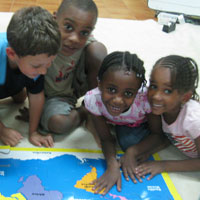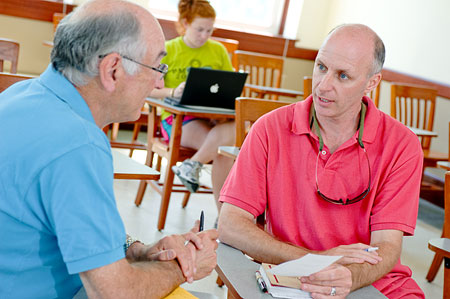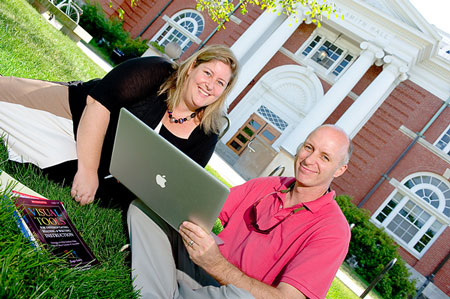Literacy Institute Draws International Students for Summer Workshops
On this last day of the Writing Institute, each student reads a final piece of writing to his or her classmates. For the past two weeks, these students—K-12 teachers, reading specialists, and teaching interns—have been writing daily, revising, sharing and responding to each other’s writing. They’ve also read and conferenced, one-on-one, with their teacher, Jack Wilde, who has taught in the New Hampshire Literacy Institutes for more than 30 years. These students came because they want to learn how to establish a writer’s workshop in their own classrooms. They didn’t expect to do as much of their own writing. But at the institutes, students learn by doing, not by lecture or prescription.
When the students read, their voices are soft and careful. These final pieces are about what matters most to them—their families, their friends, their journey.
|
Jack Wilde, institute teacher, conferences with student Marc Drummond. |
|
Heidi Cavanagh ’G99 and husband Marc Drummond traveled from Niamey, Niger, to come to the N.H. Literacy Institutes. |
Marc Drummond has traveled from Africa to attend this class. He teaches at the American International School of Niamey (AISN) in Niger. In 1999, his wife, Heidi Cavanagh, principal of AISN, earned her master of science in teaching from the New Hampshire Literacy Institutes. For years, Drummond and Cavanagh have talked about the New Hampshire Literacy Institutes and now, they’re both here in Durham, and Drummond is taking his first class.
His final piece is about growing up and going to school in Derry, Ireland, where a “blanket of gray mist always hung in the sky” and “all these wee cherry heads, arms folded” sat in the seats at school. The teacher was a marksman with chalk and “threatened 35 tykes from 9 to 3.” But it was having lunch at noon with his “Gran” that saved Drummond.
In the faculty lounge in Hamilton Smith Hall, a long table is piled high with books. Titles by revered, late UNH faculty members Don Graves, professor of education, and Don Murray, professor of English, are among them. Tom Newkirk, professor of English, founder of the institute and veteran institute teacher, has many books there including Misreading Masculinity, chosen by Instructor Magazine as one of the most significant books of the previous decade, and his most recent book, "The Art of Slow Reading."
Wilde’s book, "A Door Opens: Teaching Writing in the Fifth Grade," lies on the table as well. There are too many books to list, but all are written by teachers who are passionate about writing and teaching.
“I came here at first by happenstance,” says Cavanagh with a laugh. “I had just graduated from college in Canada and was teaching school in Ontario. It was really grim. And, then I came here for a summer course. The program encouraged you to tell your story, to look for the surprises. We spent the morning as writers and in the afternoon reflected on our own process and how we could create the writing community in our classrooms. This was really a place of learning for me. My summers here shaped my philosophy of teaching.”
Cavanagh soon embarked on an international journey that led her first to teach in Istanbul, Turkey, and then to California at a bilingual school where she soon became the assistant principal. There she met Drummond and they got married. For the next two years, they traveled to more than 26 countries before settling down to teach in Niamey, Niger.
“Our school in Niger is very small. Just 54 students, spanning pre-K-12,” says Cavanagh. “We have 17 nationalities among them. On the playground you hear everything—Hindi, Hausa, Songhai, Tamashek…French is the cement and English is the school’s language and at recess it’s world languages.”
Like most international schools, their students are children of the elite in Niger’s capital. They are the sons and daughters of government workers, NGO administrators, and business executives. The classrooms are all multiage and given the shortage of resources, everyone multi-tasks and parents are drawn in to share their skills. The school’s mission is to “educate students from diverse cultures to achieve excellence in their intellectual and personal development.”
Drummond’s classroom is for the very little ones up to second grade. There are areas for theater, puppetry, a kitchen, building blocks, and, of course, a writing center. “We encourage our older students to mentor our younger students. They do buddy readings,” says Drummond. “Our students all tell, draw, or write excellent stories.”
Cavanagh also opens the school to the community in thoughtful ways. Most international schools tend to exist in closed compounds, but Cavanagh wanted their students to understand the world in which they live. Niger is one of the world’s poorest countries and famine is not an unknown.
“During the school year, we take some of our students to a village for a week so they can experience what it’s like to live there and to sleep under the stars,” says Cavanagh. “On Saturdays, we open our rec center to the community for yoga and zumba with real African drumming. We also have a garden and sell our produce to the rec center. It teaches our students about sustainability.”
Drummond is the Saturday soccer coach and barefoot players from the neighborhood join in. “I’m not a terrific soccer player,” says Drummond. “But we are able to connect in a structured way with the community.”
These experiences help to create a shared story with the school’s wider community. As a philosophy it leads back to the New Hampshire Literacy Institute. When Jack Wilde describes his class he writes: “We try to engender a sense of community by having everyone—students and teachers—involved in and responding to the writing. By having the writing be personally meaningful, we connect with each other’s life. … There is no better community than one that listens to and honors our different stories.”
“Here you want to write!” says Drummond. “This is not my last summer here. I’m on board.”
Cavanagh smiles. “Next year, I’d like to send two teachers. There is something magical about Durham.”
American International School of Niamey (PDF)
Originally published by:
UNH Today
Written by Carrie Sherman, Editorial and Creative Services. Photos by Lisa Nugent, UNH Photographic Services.

















































